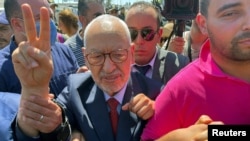Rached Ghannouchi, 81, the leader of the Islamist Ennahdha party was allowed to return home after over nine hours of hearings.
"The verdict was acquitted, thank God. We hope the rest of the cases (against other people) before the judiciary, will have the same result, because they are all fabricated cases after one decade of the revolution," Ghannouchi said.
Critics feared that it would lead to his arrest and outside the hearing in the capital, Tunis, Ghannouchi's supporters decried the proceedings as a sham orchestrated by authorities.
The central bank of the north African nation earlier this month frozen the bank accounts of Ghannouchi and a dozen other prominent party figures.
Ennahdha denies the charges of money laundering and supporting terrorism, and it claims that these accusations are made to divert attention from a referendum Saied is planning for July 25 to amend the constitution to give the president more authority.
Imed Khmiri, Ennahdha party spokesperson, said that the case against Ghannouchi is 'fabricated'.
"The main purpose is to distort the State, and to distort the Ennahdha movement as a true political opponent of the coup," he added.
Saied suspended parliament last year and seized broad powers in a move that he said was necessary to "save the country" from a political and economic crisis.
This prompted criticism from the opposition, which accuses him of shunning democracy and a slide toward totalitarianism.








